Master of Public Health Marks A Decade
The coronavirus is a defining moment in the careers of Montclair State MPH alumni
Posted in: Graduate School, Health
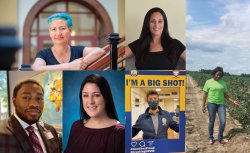
In the 10 years since Montclair State graduated its first class of students in the Master of Public Health (MPH) program, alumni have confronted some of the country’s most significant public health issues of the past decade, enduring challenges like migrant health, emerging infectious diseases, domestic violence, hunger, HIV and mental health.
The coronavirus pandemic has spotlighted the response of these alumni like never before, including their work with epidemiological modeling, infection control, education and vaccination.
“When I reflect on it now, it was an incredible experience,” says Tosan O. Boyo ’11 MPH, who served as the deputy commander of the COVID-19 Operations Center in San Francisco during the height of the pandemic. “I saw the best of humanity. I saw the worst of humanity. I found out what I was made of. I found out what I can do. I found out what can break me.”
To mark the 10-year milestone of the MPH program at Montclair State, Boyo and other alumni from the first graduating class shared their experiences in this extraordinary time in public health.
Lending a Hand to Migrant Workers
As a seasonal migrant education recruiter, Guerline Pierre ’11 MPH visits Gloucester County blueberry farms from May to August to enroll children of the laborers in summer school and provide families access to health care and social services. Her career has focused on maternal and child health and bringing public health to the grassroots level. With the pandemic, she recognized that the needs within the tightly packed farm camps were even greater than usual.
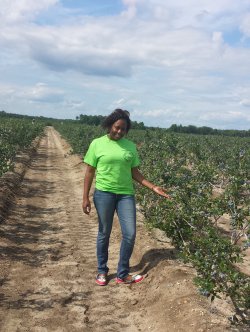
“The families live in these large bunkers, and it’s a community, a small little community where they cook, eat, work and everyone is close,” Pierre says.
With the nonprofit she founded, LAMP (Latin Americans for Medical Progress), Pierre mobilized volunteers to assist the migrant workers. “We were able to raise a decent amount of funds to get boots on the ground and distribute PPE, masks and hand sanitizers to the various farm camps.” The group educated families on the importance of social distancing, wearing masks and provided a list of community resources in both Spanish and Haitian-Creole.
“This summer, my goal is to go out there in the community and encourage the farm workers to get vaccinated and provide translation to education materials and information so that they know where they can go get tested, where they can go and get vaccinated,” she says.
Looking at the Big Picture
“We’re looking at the big picture to make effective decisions,” says Christopher Hellwig ’11 MPH, health officer in New Jersey for the Hamilton Township Division of Health.
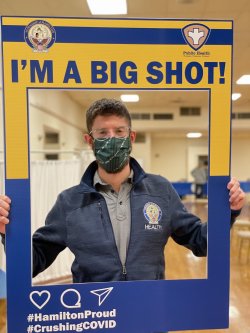
Hamilton is a large municipality within Mercer County with nine long-term care facilities, an acute care hospital, numerous state and federal buildings, warehouses and Fortune 500 companies. His pandemic work included everything from contact tracing to ensuring that businesses and restaurants understood the safety rules.
As an early provider of vaccinations, Hellwig was able to tailor outreach for the most vulnerable populations to ensure they received the vaccination close to home and in a safe manner.
“Public health is public for a reason, because it’s not just one-on-one, it takes everyone,” he says.
Finding Ways to Distribute Food
A decade ago, Megan Kirschner Allain ’07, ’11 MPH traveled to Nicaragua to develop and implement an HIV/STD prevention program in an impoverished neighborhood. Community outreach has guided her career ever since.
With a need for food assistance during the COVID-19 outbreak, she responded by helping provide groceries and meals to those in need in Gloucester, Salem and Cumberland counties as part of her role as director of Community Benefits and Outreach for the Inspira Health Network.
“A lot of the questions I received were about food and feeding people, so for a while that was what I was doing, fielding questions about food pantry locations or getting data from the food bank about food they had and where it could be distributed. I was making those connections and connecting those dots.”
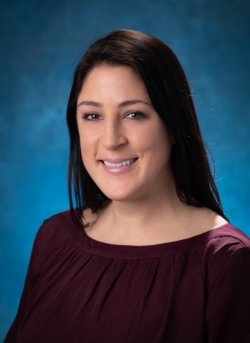
Researching Rise in Domestic Violence
Donna Meeker-O’Rourke ’11 MPH, newly named program specialist for the Global Center on Human Trafficking at Montclair State, will also be beginning her PhD in the Family Science and Human Development program with a research focus on domestic violence, which has been on the rise during the pandemic.
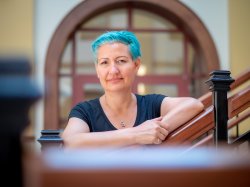
She’s followed a nontraditional path, discovering by chance as an undergraduate in anthropology, the study of epidemiology and the control of diseases. It was a subject she taught and the focus of several research projects after earning her MPH. Her background in public health segued to health and fitness as she became a personal trainer.
“I created a community and my vision was to empower people to become their best selves.” Certified as a mind, body, health coach, she provided sessions for people who suffered from PTSD, specifically military, first responders and police officers.
The business folded just as the pandemic hit and she returned to Montclair State for work, volunteering in efforts to check in with students. “I spent many nights just calling students to make sure they were OK and checking to see if they needed any resources.”
Someone to Turn to For Advice
“I am definitely the COVID girl,” says Dawn Snyder ’06, ’11 MPH. “I get text messages at ridiculous hours of the night and the day saying ‘my so-and-so tested positive, my so-and-so has symptoms. We have a fever. Can you test me? What should I do? What should I drink? How should I act?’ And then the people who do test positive, I follow up with them weekly. ‘How are you doing? Do you need a retest? Follow CDC guidelines, stay home, stay hydrated, do what you have to do. Stay away from your family,’ which is hard. It’s a really hard time.”
Snyder earned her undergraduate degree in Health Education/Community Health Services, her MPH in Community Health Education and served as an adjunct professor in Public Health at Montclair State before moving to Florida to join the nonprofit organization Broward House, which serves people impacted by chronic health challenges, as a prevention manager focused on counseling clients’ at-risk behaviors, mental health and substance abuse, and testing of Hepatitis C, HIV and STIs.
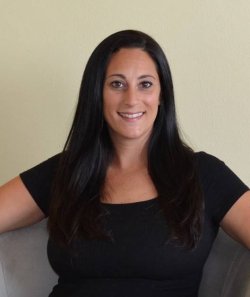
“I was heavily engrossed in that world, and then COVID hit,” she says. She was deployed with the National Guard because her experience testing HIV antibodies and antigens was needed to help set up the first drive-through antibody testing site in the state of Florida. “We were there 10 days, 10-hour days setting everything up and making sure the logistics flowed.” In February, she started a new job as director of field operations for COVID-19 testing with Florida-based Synergy Diagnostics.
‘Stand Straight, Walk and Be Stable’
In California, Tosan O. Boyo ’11 MPH, was asked to step out of his role in hospital operations to manage the COVID-19 Operations Center for the city and county of San Francisco. The Bay Area was the first place in the nation to pass a shelter-in-place law to address the coronavirus pandemic.
He expected it to be a short-term role away from his work as chief operating officer at Zuckerberg San Francisco General. The plan was for him to help build the operational infrastructure. “I’m going to coach the team, map out the workflows, create processes, what are our goals and all that stuff. And then in my first week, there was this Grand Princess cruise ship on its way to America that essentially had a COVID outbreak. My two-week assignment turned into an eight-month assignment.”
In his new role as senior vice president of hospital operations at John Muir Health, a hospital network based in Walnut Creek, California, he oversees the daily operations for three hospitals, leads vaccination campaigns and develops behavioral health strategies.
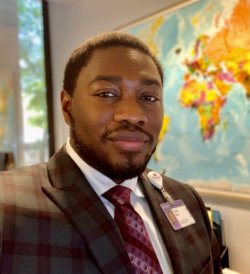
“Public health really is the infrastructure of humanity,” he says. “Once you remove that infrastructure, everything collapses. I don’t know if a lot of people have seen it that way until the pandemic. Public health was just something that happened where people made sure your restaurant stayed open or people who did some obscure administrative work in hospitals and boards with diseases. But people who work at public health, we’re the ones that keep the skeleton strong. We’re the ones that keep the bones from being brittle. We’re the ones that make sure you can continue to stand straight and walk and be stable.”
Story by Staff Writer Marilyn Joyce Lehren
You May Also Like:
